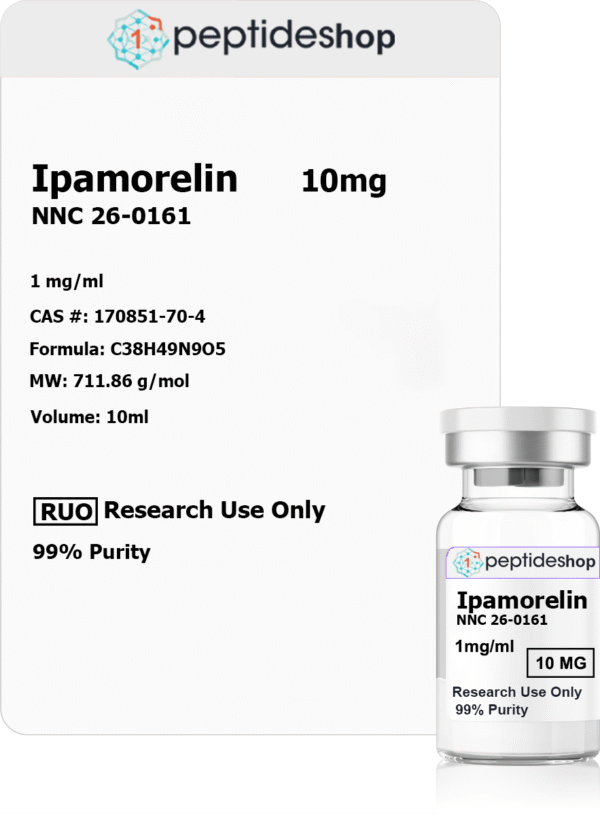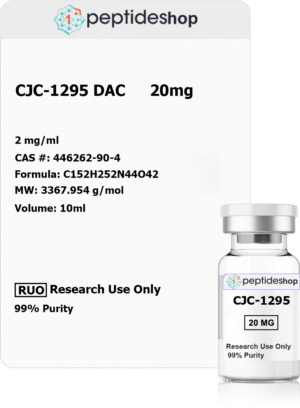Ipamorelin (10mg)
Original price was: $85.00.$46.00Current price is: $46.00.
Ipamorelin is a short peptide sequence capable of binding to the ghrelin/growth hormone secretagogue receptor. It is one of the most selective growth hormone (GH) secretagogues known and has been shown in laboratory studies to have no effect on ACTH, prolactin, follicle-stimulating hormone, luteinizing hormone, thyroid-stimulating hormone, or cortisol release . Given its high level of specificity, ipamorelin has been of interest in research both as a therapeutic in and of itself as well as a model peptide for understanding how selectivity in GH receptor binding is achieved. Its presence plays a key role in the overall growth and repair of musculoskeletal tissue.
Contents of the Package
- 1 x sterile 10ml multi-dose vial
- Concentration: 1mg/ml of Ipamorelin
- Reconstituted in bacteriostatic saline solution
- Clear, sterile injectable fluid
- For subcutaneous injection only
About Ipamorelin
Ipamorelin is a selective growth hormone secretagogue (GHS) and ghrelin receptor agonist. It is part of the GHRP (Growth Hormone Releasing Peptide) family, known for stimulating the body’s natural production of growth hormone (GH) without significantly affecting cortisol or prolactin levels.
Ipamorelin stands out for its clean pharmacological profile, low risk of side effects, and high receptor selectivity. It mimics the ghrelin peptide by binding to GHSR-1a receptors in the pituitary and hypothalamus, leading to endogenous GH release and a cascade of regenerative, anabolic, and metabolic benefits.
Mechanism of Action
Ipamorelin works by binding to the ghrelin (GHSR-1a) receptor, stimulating the release of growth hormone (GH) from the anterior pituitary. It does not directly replace GH, but instead signals the body to enhance its natural pulsatile secretion.
Key pharmacological actions include:
- Increased GH pulse amplitude
- Minimal impact on ACTH, cortisol, or prolactin levels
- Improved IGF-1 production via liver stimulation
- Enhanced protein synthesis and fat metabolism
- Preservation of natural GH feedback mechanisms
This makes Ipamorelin ideal for long-term use, with low risk of endocrine disruption.
Adverse Reactions
Ipamorelin is generally well tolerated, especially compared to other GHRPs like GHRP-6 or GHRP-2. Side effects are rare and often dose-dependent.
Reported effects may include:
- Mild flushing or lightheadedness
- Temporary fatigue or drowsiness
- Injection site irritation
- Occasional increase in appetite (mild, ghrelin-like effect)
Unlike older GHRPs, Ipamorelin does not significantly increase cortisol or prolactin, which greatly improves tolerability.
Benefits
Potential Benefits:
- Enhanced muscle recovery and fat burning
- Increased lean body mass over time
- Better sleep quality and GH-related circadian rhythm support
- Improved skin health, collagen synthesis, and joint repair
- Cognitive and mood enhancement via IGF-1 elevation
- No significant appetite spikes or bloating (compared to GHRP-6)
Side Effects
⚠️ Possible Side Effects:
- Mild injection site redness
- Temporary tiredness or flushing
- Rare: dizziness, headache, or increased hunger
- No cortisol, prolactin, or estrogen-related effects reported
Contraindications & Precautions
- Do not use in individuals with known peptide allergies
- Caution in patients with active cancers or a history of tumor growth influenced by IGF-1
- Not recommended in those with untreated pituitary or adrenal disorders
- Avoid use in combination with high-dose GH without endocrine supervision
Drug Interactions
Ipamorelin is commonly stacked with other peptides such as:
- CJC-1295 (with or without DAC)
- GHRH analogs
- BPC-157 for recovery
- Fat-burning compounds (e.g., L-Carnitine)
No direct interactions are known with pharmaceuticals, but it may synergize with insulin-sensitizing agents and anabolic hormones in some protocols.
Pregnancy & Breastfeeding
Due to a lack of human safety data and potential hormonal effects, Ipamorelin is not recommended during pregnancy or lactation. Animal studies have not conclusively demonstrated teratogenic effects, but use during these phases should be avoided.
Children
Ipamorelin is not approved for pediatric use. While it may stimulate GH in GH-deficient children, it should only be used in a clinical setting under specialist care. Off-label or unsupervised pediatric use is contraindicated.
FDA approval
Ipamorelin is not approved by the FDA as a prescription medication. It remains a research compound and investigational peptide, though widely used in compounding and functional medicine settings for its regenerative and metabolic potential.
References
- Sun Y, et al. (2004). “Ghrelin and GHSR-1a receptor pharmacology.” Journal of Clinical Endocrinology & Metabolism.
- Smith RG, et al. (2005). “Selective ghrelin mimetics in therapeutic development.” Endocrine Reviews.
- Walker RF, et al. (2006). “Ipamorelin as a growth hormone secretagogue.” Neuroendocrinology Letters.
- Garcia JM, et al. (2010). “GHRP receptor agonists in muscle wasting and metabolic syndrome.” Expert Opinion on Investigational Drugs.
- Nass R, et al. (2008). “Endocrine response to ipamorelin: A GHS analog.” Growth Hormone & IGF Research.





